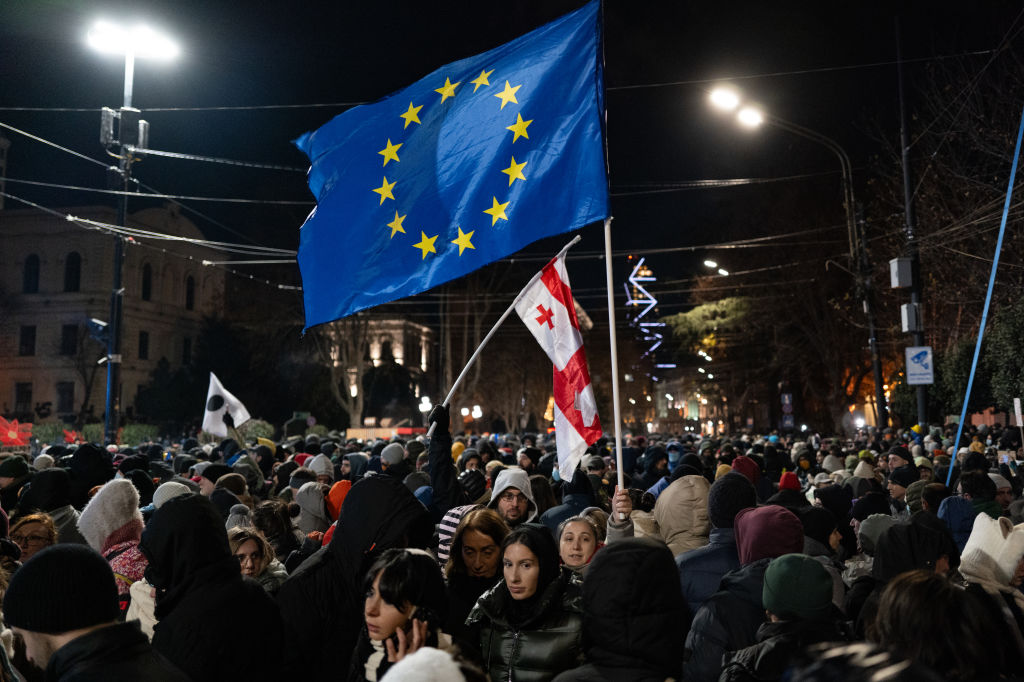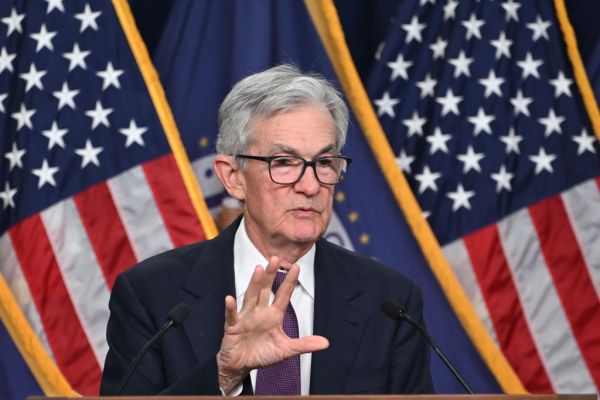Happy Friday! Applications are now open for our summer 2025 intern class! If you or someone you know is interested in working with us, check out the application posting here.
Quick Hits: Today’s Top Stories
- Secretary of State Antony Blinken said Thursday that the U.S. is considering sending officials to liaise with Hayat Tahrir Al-Sham (HTS), the rebel group that spearheaded the toppling of Bashar al-Assad’s regime and is now leading a transitional government. “We’ve been in direct contact, and we’re also looking at getting people on the ground in Syria,” Blinken said in an interview with Bloomberg. “We need to see concrete action, not simply positive declarations.” HTS, which began as an al-Qaeda splinter group, remains a U.S.-designated foreign terrorist organization. Separately, the Department of Defense (DOD) revealed Thursday that 2,000 American troops were operating in Syria, more than double the previously disclosed number. A Pentagon spokesman said the elevated troop presence predates the fall of the Assad regime.
- The House of Representatives failed Thursday evening to pass a funding bill to avert a government shutdown. The final vote was 174 to 235, with 38 Republicans joining 197 Democrats in opposition despite President-elect Donald Trump backing the measure. Republican House Speaker Mike Johnson put the bill on the floor the day after Trump—along with Tesla CEO and Trump confidant Elon Musk—torpedoed his original spending bill negotiated earlier this week. Without additional funding, the government is due to shut down this Saturday at 12:01 a.m.
- The Federal Aviation Administration (FAA) temporarily prohibited drone flights in parts of New Jersey near critical infrastructure. The agency published 22 temporary flight restrictions in the Garden State on Wednesday that the FAA said came “at the request of federal security partners.” A spokesman for the Department of Homeland Security said in a statement, “We continue to assess there is no public safety threat relating to the reported drone sightings,” adding that the restrictions were requested “out of an abundance of caution.” Meanwhile, the DOD said Thursday that anti-drone equipment able to detect and disable drones is in the process of being deployed in New Jersey.
- Drivers and warehouse workers at Amazon facilities in at least four different states went on strike Thursday after the Teamsters union voted in favor of the move. Approximately 10,000 workers support their efforts according to the Teamsters, although it’s unclear how many joined the picket lines yesterday. Amazon has argued that the Teamsters do not represent workers and that the workers are actually employed by external delivery service partners, not by the company.
- U.S. life expectancy increased to 78.4 years in 2023, up from 77.5 years in 2022, according to a report released Thursday by the Centers for Disease Control and Prevention. The increase is attributed to largely declining death rates from COVID-19, heart disease, and drug overdoses. Life expectancy has yet to reach the pre-pandemic level of 78.8 years in 2019.
- A Georgia appeals court removed Fulton County District Attorney Fani Willis on Thursday as the prosecutor in the state’s election interference case against Trump and his co-defendants. However, the Georgia court rejected a motion from the defendants to dismiss the indictment altogether. The ruling involved allegations that Willis benefitted financially from her relationship with a special prosecutor assisting Willis’ case against Trump. “While we recognize that an appearance of impropriety generally is not enough to support disqualification, this is the rare case in which disqualification is mandated and no other remedy will suffice to restore public confidence in the integrity of these proceedings,” the court said in a ruling that overturned a lower court decision.
‘Fighting Day and Night’

The last time we covered the nation of Georgia, we noted that the October parliamentary elections could potentially be “the final hinge point for Georgia’s future.” The Russia-aligned ruling party, Georgian Dream, kept its hold on power in those elections, but they were rife with signs of corruption and government interference.
Over the last two months, the battle between Georgia’s largely pro-European citizens and a government bent on consolidating power and moving away from the West has only grown. The nation is still riven by protests, with two futures in the balance: the West or Russia.
For more than a year, Georgian Dream has carried out a pivot toward Russia, expressing increasing hostility toward the U.S. and Europe. Bidzina Ivanishvili—a Georgian billionaire with a net worth that is roughly a quarter of Georgia’s GDP and who made his money through investments in Russia in the 1990s—founded the party and spearheaded the warming of relations with Moscow.
During the campaign, Georgian Dream cast the election as a choice between war and peace, arguing that the opposition were tools of a “global war party,” consisting of the U.S. and European allies, responsible for Russia’s 2008 invasion of Georgia and the invasion of Ukraine. Some Georgian Dream lawmakers even blamed the conspiracy on—who else?—“Freemasons.”
In the elections, the Georgian Dream party retained its grip on power with roughly 54 percent of the vote and 89 out of 155 seats, outstripping the next closest party, the Coalition for Change, which only won 11 percent. Georgian Dream certainly draws support from many voters, particularly those in rural areas, who are persuaded by the party’s messaging about Russia and identify with its socially conservative policies like banning same-sex marriage. But the election results were sketchy, to say the least.
Three independent Georgian election monitors—the International Society for Fair Elections and Democracy, Myvote for EU, and the Georgian Young Lawyers Association—said that their roughly 3,500 election observers saw “a consistent pattern of manipulation that suggests the election was rigged to favor the ruling party.” Observers witnessed instances of vote-buying, ballot stuffing, and a general climate of intimidation, such as the presence of cameras in voting stations—a move observers say violated the secrecy of who people voted for.
EU officials echoed these concerns, and the European Parliament called for new elections saying the results “do not serve as a reliable representation of the will of the Georgian people.” American officials also criticized Georgian Dream’s interference. “The Georgian people went to the polls on Saturday in an election environment shaped by the ruling party’s policies, including misuse of public resources, vote buying, and voter intimidation,” State Department spokesman Matthew Miller said the day after the elections.
Tens of thousands of Georgians took to the streets in the capital of Tbilisi, rallied by Georgia’s independent, pro-European, President Salome Zourabichvili. As protestors outside of parliament waved Georgian and EU flags, she proclaimed, “They stole your vote and tried to steal your future, but no one has the right to do that and you will not let anyone do that!”
The protests continued for several weeks, mostly led by younger, more educated Georgians. The government, led by Georgian Dream Prime Minister Irakli Kobakhidze, cracked down. Hard. Police used water cannons and tear gas against crowds, who hurled back rocks and shot fireworks at police formations, creating spectacular scenes that have become symbols of defiance. But the demonstrations began to lessen toward the end of November.
That is until Kobakhidze made Georgian Dream’s opposition to EU membership abundantly clear by announcing a “postponement” of the accession process until 2028. Protests reignited in even larger numbers than before. “They said we cannot antagonize Russia, but we’ll still get you into Europe, which is why they got voters,” Laura Linderman, a senior fellow at the American Foreign Policy Institute who specializes in Georgian politics, told TMD. “It wasn’t until they actually showed their true lack of interest in Europe that people really got angry.” Somewhere around 80 to 90 percent of Georgians support joining the EU.
Protesters were again met by striking levels of police brutality. People have been beaten till their bones break and hundreds have been detained. In a small country of 3.7 million people, less than the population of Los Angeles, practically everyone knows someone who was either protesting, beaten, or detained, said Linderman. Protests, albeit smaller ones, have spread outside the capital.
The demonstrations have continued every day now for three straight weeks.
People have held the line in the streets and even in their work, but opposition parties have struggled to coalesce around a set of leaders. President Zourabichvili has emerged as a sort of opposition figurehead, even joining protesters in shoving back police lines. She has also become an unofficial ambassador for Georgian protestors, meeting with Ukrainian President Volodymyr Zelenksy earlier this month at the re-opening of Notre Dame Cathedral and giving a speech to the European Parliament on Wednesday this week.
Zourabichvili is also slated to step down on December 29 to make way for incoming President Mikheil Kavelashvili, a former pro soccer player and Georgian Dream politician, elected by a parliament in which the opposition refuses to take part. Zourabichvili has said she will refuse to vacate her office. “I remain your president—there is no legitimate Parliament and thus no legitimate election or inauguration,” she wrote on X last month.
But beyond the 72-year-old Zourabachvilli, there is currently little in the way of an organized infrastructure for the opposition. The two main opposition groupings—the Coalition for Change and the United National Movement—were unable to do much to oppose Georgian Dream’s attempts to rig the election. Disorganized and often accused even by their allies of never leaving Tbilisi, the two blocs withdrew in protest from the parliament in November, leaving it bereft of a dissenting force within the government. Georgian Dream has also contributed to the disorganization, forcibly arresting opposition leaders and raiding party headquarters.
Georgians are now looking to Europe and the U.S. for support against Georgian Dream. “Where Georgians have been fighting day and night, Europeans have been slow to wake up and slow to react,” said Zourabichvili in a Wednesday speech to the European Parliament.
Former U.S. officials have argued America has the tools to act. “It is a country in which we have significant influence if we choose to exercise it,” David Kramer, the executive director of the George Bush Institute and former assistant secretary of state for democracy, human rights, and labor during the George W. Bush administration, told TMD.
So far, the Biden administration has opted for a somewhat limited sanctions strategy to pressure Georgian Dream. Last week, the State Department announced that it was imposing visa restrictions on 20 unnamed individuals “who are responsible for, or complicit in, undermining democracy in Georgia.” The sanctioned persons include security officials, politicians, and private citizens, according to the statement, building on a policy that was announced in May in response to a law restricting the activities of NGOs inside the country.
The White House went a step further on Thursday, announcing visa restrictions on two Georgian Dream politicians—Minister of Internal Affairs Vakhtang Gomelauri and the Deputy Head of the Ministry’s Special Tasks Department Mirza Kezevadze—responsible for overseeing the police crackdown on protestors. At nearly the same time, the United Kingdom announced sanctions on Gomelauri and four other individuals, including the deputy minister for internal affairs and three police chiefs. This follows decisions last week to stop all program support to Georgia, reduce defense cooperation, and limit communications with Georgian Dream politicians. “The U.K. will continue to stand by the people of Georgia in supporting their right to choose their country’s future,” said Foreign Secretary David Lammy.
Kramer argued that stronger sanctions against high-ranking Georgian officials, including Ivanishvili and Kobakhidze, are a necessary next step. (He spoke to TMD on Wednesday, before the second set of sanctions were announced). Restrictions on specific officials, coupled with non-recognition of the current government is, in his view, the only way to put sufficient pressure on Georgian Dream. “It is not just to penalize Ivanashvili for what he is responsible for, but it is also to attach the stigma that he is no longer deemed as legitimate, or even kosher, in the West,” Kramer said. “There’ll be a huge boost to the people turning out in the streets every single day.”
Significant help from Europe is likely not forthcoming. The EU voted Monday to end visa-free travel for Georgian diplomats and high-ranking ministers. This, however, is a largely symbolic step, as Georgians can fairly easily apply for non-diplomatic visas to circumvent the ban. Hungary and Slovakia vetoed a proposed broader sanctions package. But more severe travel bans, ones that materially affect the ability of Georgian Dream politicians, their family, and their friends to travel to Europe might have an outsized effect. Even relatively middle-class Georgians have become used to traveling to Europe—a Ryanair flight from Tbilisi to Milan now starts at around €22 (if you’re willing to travel with only a backpack).
In a small country with an even smaller political elite, these kinds of actions can have real consequences, said Linderman. “That is actually quite impactful,” she told TMD. “Travel bans of Georgian Dreams’ families, especially, are a very straightforward way to break this deadlock.”
Observers hope additional pressure could spur a cascade of defections. “If the West sanctioned Ivanishvili, I dare say that there’s the possibility that there would be massive defections, and then you would have calls for a new election,” said Kramer. There are already some hints of wavering. Multiple diplomats have already publicly resigned, including Georgia’s ambassador to the U.S., David Zalkaliani. Given that Russia is currently preoccupied, the time is ripe for Western action, Linderman argued. “They’re pretty busy in Ukraine,” Linderman said, pointing to the Russian abandonment of allies in Armenia in 2023 and their current evacuation from critical military bases in Syria. “This is a historic moment, so you’ve got to take your shot.”
“It is the most pro-American country in the region, the most pro-European country in the region, and the most democratic country in the region,” said Kramer. The next few months will likely decide if it stays that way.
Worth Your Time
- In his blog The Homebound Symphony, Alan Jacobs revisited some questions about family raised in Christopher Lasch’s 1978 book, Haven in a Heartless World: The Family Besieged. “Some critics on the Right denounced it as Marxist, while other critics on the Left denounced it as reactionary,” Jacobs writes. “On both sides there was, I think, a failure to understand what Lasch was primarily trying to do, which was to demonstrate the woeful inadequacy of then-current social-scientific thinking about the family—and to indicate some of the dire consequences of that inadequacy. … One of the difficult questions Lasch raises is this: Why had parents, in the decades preceding the writing of the book, so often acquiesced in being sidelined? Why had they agreed to allow schools and institutions linked to schools—primarily clinical counseling of various kinds —usurp the role of formation that had once been essential to the family?
- Writing for Works In Progress, Nick Whitaker dove into the world of pour-over coffee in this fascinating exploration of the history and potential future of coffee shops. “In the U.S., almost every coffee shop serves drip coffee,” Whitaker writes. “It’s made from a machine similar to the ones many Americans have at home. You put a filter paper full of coffee grounds in, the machine dispenses hot water over it, and a pot is filled with coffee. There are many ways of brewing coffee, though. One is especially elegant, technical, and ritualistic: the hand-brewed pour-over. In the last 20 years, pour-over has become a symbol of quality and craft in coffee. Pour-over is a challenge for coffee shops. Many are proud to offer it, but the time-consuming process interrupts service and often produces inconsistent results. How to brew the perfect cup of coffee remains a vexing question. Like espresso, new technologies might be poised to revolutionize coffee brewing at home and in the café.”
Presented Without Comment
Axios: Rand Paul Floats Elon Musk for House Speaker
Also Presented Without Comment
President-elect Donald J. Trump posted the following yesterday morning on Truth Social after his Wednesday night dinner with Jeff Bezos, the latest in a string of tech CEO visits to Mar-a-Lago:
EVERYBODY WANTS TO BE MY FRIEND!!!
In the Zeitgeist
If you enjoyed the portrayal of combat in Alex Garland’s Civil War, you’ll probably like his latest project, Warfare. The movie, co-written and co-directed by ex-Navy Seal Ray Mendoza, tells the real story of a sniper overwatch mission he was a part of in Iraq in 2006.
Toeing the Company Line
- In the newsletters: Will Rinehart outlined how the Department of Government Efficiency (DOGE) could fall short, and Nick Catoggio unpacked Elon Musk’s role in tanking the government funding bill.
- On the podcasts: Sarah Isgur, Jonah Goldberg, and Steve Hayes discussed the potential government shutdown and how Musk fits into the incoming administration in the latest edition of The Dispatch Podcast.
- On the site: Michael Warren explores RFK Jr.’s popularity, Charles Hilu breaks down the government funding chaos and the implications for Speaker Mike Johnson, and Kevin D. Williamson argues Congress is stuck in an “ad-hocracy” when it comes to spending and budgeting.
Let Us Know
Should the U.S. and Europe provide stronger backing to the Georgian opposition?







Please note that we at The Dispatch hold ourselves, our work, and our commenters to a higher standard than other places on the internet. We welcome comments that foster genuine debate or discussion—including comments critical of us or our work—but responses that include ad hominem attacks on fellow Dispatch members or are intended to stoke fear and anger may be moderated.
With your membership, you only have the ability to comment on The Morning Dispatch articles. Consider upgrading to join the conversation everywhere.